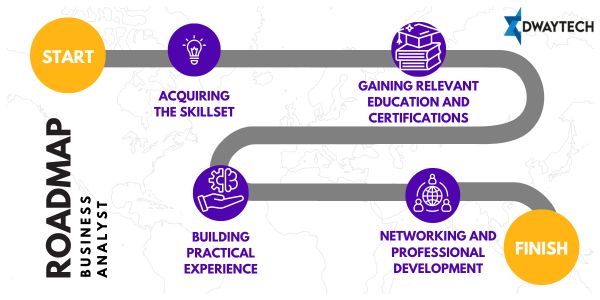Business Analyst Roadmap for Beginners – Are you interested in the world of business analysis? Do you have an ability for problem-solving and a passion for analyzing data? If the answer is yes, then you may be interested in pursuing a career as a business analyst.
In this article, we will provide you with a comprehensive roadmap to kickstart your journey in this exciting field. From acquiring the necessary skills to finding the right opportunities, this guide will equip beginners with the knowledge and resources they need to succeed.
The Fundamentals of Business Analysis
Before going through the roadmap, it’s essential to understand the basic principles of business analysis. At its core, business analysis involves identifying business needs, defining solutions, and facilitating the implementation of those solutions. Business analysts act as the bridge between stakeholders and IT professionals, ensuring effective communication and understanding between the two parties. Now, let’s explore the different steps you can take to embark on your business analyst career.

Step 1: Acquiring the Skillset
To become a successful business analyst, you need to develop a specific skill set that encompasses both technical and soft skills.
Here are some key skills you should focus on.
Analytical Thinking: As a business analyst, you will need to analyze complex problems and identify potential solutions. Developing strong analytical thinking skills will be vital in this role.
Communication Skills: Effective communication is crucial for gathering requirements, conducting interviews, and presenting your findings. Enhancing your verbal and written communication skills will significantly benefit your career.
Business Knowledge: Understanding various industries and their processes is essential for a business analyst. Investing time in learning about different domains will enhance your ability to comprehend and solve business problems.
Technical Proficiency: While business analysts aren’t expected to code, having a basic understanding of technical concepts and tools will enable you to collaborate effectively with IT professionals.
Problem-Solving Skills: Problem-solving is at the heart of business analysis. Developing your problem-solving skills will allow you to identify the root causes of issues and propose effective solutions.
Step 2: Gaining Relevant Education and Certifications
Acquiring a relevant educational background and certifications is an excellent way to demonstrate your expertise and stand out in the competitive job market. Consider the following options:
Bachelor’s Degree: A Bachelor’s degree suffices for building a strong foundation for your career as a business analyst.
Certifications: Industry-recognized certifications such as the Certified Business Analysis Professional (CBAP) and the Certification of Capability in Business Analysis (CCBA) can significantly boost your credibility and marketability.
Step 3: Building Practical Experience
While theoretical knowledge is essential, practical experience is equally vital for a successful business analyst career. Here are some strategies to gain practical experience as a beginner:
Internships: Seek out internships or entry-level positions that offer hands-on experience in business analysis. This will allow you to apply your skills in real-world scenarios and learn from experienced professionals.
Volunteer Projects: Offer your services to non-profit organizations or small businesses to gain practical experience. These projects can help you refine your skills and build a strong portfolio.
Step 4: Networking and Professional Development
Building a strong professional network is invaluable in any career, and business analysis is no exception. Here are some ways to expand your network as a beginner.
Join Professional Associations: Become a member of organizations such as the International Institute of Business Analysis (IIBA) to connect with other professionals in the field and access valuable resources.
Attend Conferences and Workshops: Participating in industry events allows you to stay updated on the latest trends and network with experienced business analysts.
Online Communities and Forums: Engaging in online communities and forums dedicated to business analysis provides opportunities to learn from others, seek advice, and showcase your knowledge.
Conclusion
Embarking on a career as a business analyst can be a rewarding and exciting journey. By following this comprehensive roadmap, beginners can acquire the necessary skills, gain practical experience, and build a strong professional network. Remember to continuously enhance your skills, stay updated on industry trends, and embrace growth opportunities.
So, are you ready to embark on the path towards a successful business analyst career?
Also, Useful Links:
Business Analyst Training Course Online Request Demo










